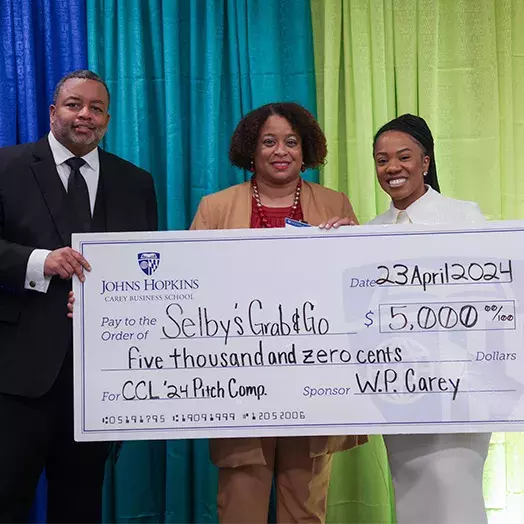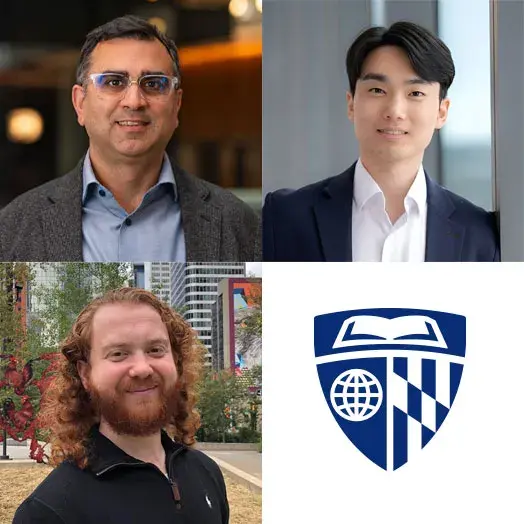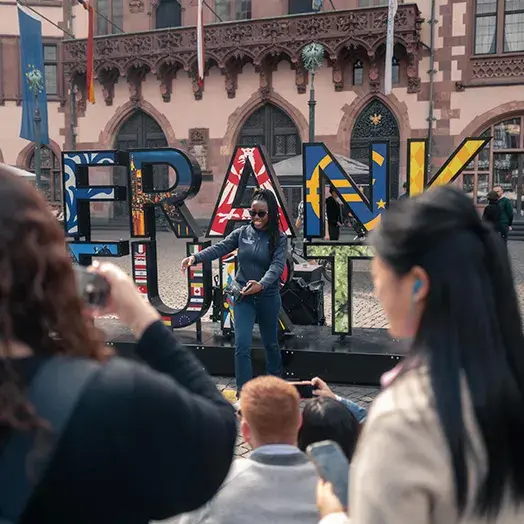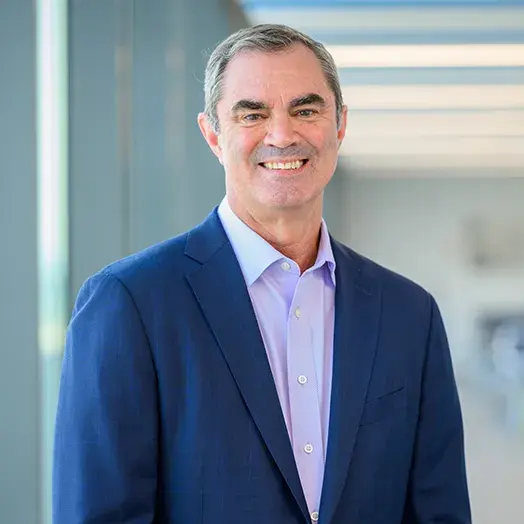Karen Selby improved her family-owned business this year with the help of a Carey initiative.

Minority-owned business gets new life through Community Consulting Lab
Karen Selby, a local entrepreneur and owner of Selby’s Grab and Go in Waldorf, Md., defied all odds earlier this spring when she participated in the Johns Hopkins Carey Business School’s Community Consulting Lab program and brought home a $5,000 cash prize to support the family-owned business that she runs alongside her husband, Chef Kendall Selby.
Selby graduated from the program more motivated than ever.
“I’ve got two teenagers and an elderly mother, and all of this stuff that I’m juggling,” she said. “But I left there thinking this was my sign not to give up. Being a small-business owner is hard. Going through the program motivated me to keep going, and see that, okay this can really work.”
The unique program pairs graduate students with local minority-owned small businesses, creating a two-way street of learning, mentorship, and growth.
Selby was impressed by how engaged and smart her student team was. She said they took a deep dive into her business and its financial health. Ultimately, they helped her improve Selby’s Grab and Go.
“They basically told us, ‘If you don’t do things differently, you’re going to be out of business by July,’ and now it’s August, and we’re still here because we turned a corner. They took the time to understand us, they came and ate our food. They drank our iced tea. Everything they told me, I tried to take it to heart, I tried to implement the changes that they recommended.”
Selby applied for the program at the eleventh hour before applications were due. That didn’t stop Tracy Akinade, associate director of Community Engagement and Economic Impact and the lead for Carey’s CCL, from recognizing her potential.
“Karen was passionate about her business, and I wasn’t so much looking for perfection as I was looking for commitment,” said Akinade. “The whole point of the program is to leave more well-versed in your business. Karen had a certain level of commitment to see it through. She was very open to the idea of letting students behind-the-scenes of her business, and that’s a vulnerable space for an entrepreneur. She stood out as someone who was ready to change.”
CCL provides participating entrepreneurs and students with curriculum that focuses on financial literacy. The business owners learn how to strategically plan and forecast their business, and then scale and refine their model for growth. The student teams act as consultants and provide specific recommendations tailored to the needs of each business. The program concludes with a showcase competition where the top four entrepreneurs present to lenders and have the chance to win some financial support.
“Confidence in your finances is key for entrepreneurs,” said Akinade. And CCL is a way for minority business owners to gain just that.
Will Holmes, owner of Will Holmes Consulting and founder of the Baltimore Economic Leadership League, partners with Akinade. He coaches CCL participants and connects them to the greater DMV business community. His guidance is intensive; he meets regularly with each business owner and with each group of student consultants, giving them a deeper and broader understanding of both the general work of entrepreneurship and the specific concerns of each business case.
“It was quite the time commitment, but I know I never missed a class, and I don’t recall others missing class either, because the information is so valuable,” said Selby.
And the knowledge Selby gained, she’s able to apply in her day-to-day, even months after the program ended.
“Now I have a formula, and I will always have something I can refer back to for my business that can be applied across the board.”
CCL runs every February to April and recruiting for minority entrepreneurs and community partners begins in late fall. Akinade is excited to grow the 2025 CCL program, after experiencing the success of this year’s.
What to Read Next

research
History made: The rise of the NCAA women’s basketball tournamentAkinade shared her pride in both the students and the entrepreneurs after the program came to a close, and that their shared growth in confidence and skillsets is what separates CCL apart from other accelerator programs that exist in Baltimore. Akinade said it’s a rewarding process to lead.
“Karen needed that business acumen that the students provided, and the students needed to be challenged and have that experience of consulting a business,” said Akinade. “This program has changed me as a professional. It’s shown me the power of connection and the role of a business school in a community. My greatest ambition is to showcase CCL’s viability, in addition to what it stands to offer, and to attract the right partners to grow it. Any entrepreneur considering the program should apply.”


